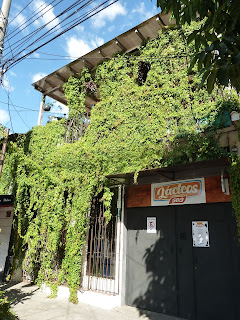Swinging on our anchor line we bounce on gentle
waves at the tiny port town of Amapala, Honduras, on the volcanic island of El
Tigre. It is a beautiful evening. A short distance away, the setting sun imparts
glowing colours on the shore buildings. We
have sun downers in hand which are providing to our senses an additional artificial
glow.
A peaceful quiet anchorage at Amapala, Isla El Tigre, Honduras.
What can we remember of the days in between
our last writing? Pictures are
artificial little vignettes salvaged from life’s stream of memories, yet
despite how many pictures we take there are never enough of them to remember
all of the real experience. Memories
blur and special fragments are lost forever.
One of the tragedies of travels too speedy is there is so much blur. Spending more time at a place provides a better
sense of knowing it. Yet the luxury of
time is also its disproof: there is never really enough time spent in any place
for the luxury to be more than an illusion.
We were five weeks in El Salvador, a
country that proved to be a lovely marvel of friendly welcoming people. Despite the inevitable momentary instances of
discomfort that result from travel to a developing country, we find ourselves new
devotees – may El Salvador ever thrive and may we soon return.
Before leaving, the possibility of another
road trip called. We set out to visit the
highest elevation in El Salvador and also the nearby mountain town of La Palma. But first stop was at the Mayan ruins of Cihuatan,
where we found ourselves the only visitors that day. We walked the very large site unguided. Helping us to understand the ruins were a few
signs with English descriptions and a very good picture museum at the entrance.
The site was burned to the ground in
A.D. 1200 from an unknown war of Mayan origin; the fleeing (or perhaps dead)
inhabitants never returned.

I never thought that I would be hungry and desperate enough to breakfast at La Pollo Campero.
Cihuatan Maya Ruins all to ourselves.
A steep serpentine road brought us to the
town of La Palma, which in the 1970’s came under the influence of the mural artist
Fernando Llort. By establishing a
teaching co-op there, he bequeathed to the region’s artisans the means to earn pride
of living by continuing in the example of his unique style.
A new sign for the door on our head.
The selection of booze was short but the bar girls were cute.
Street Candy at La Palma
Alice sampled the local street grog spiked with Flora de Cana (rum) and nutmeg
El Pital is the highest mountain, but it
was our donkey that did most of the work climbing. When the steep slope of the dirt track road exactly
matched the maximum motive power of the Kia Soul’s engine, the donkey brayed
and stubbornly refused to go further. At
this spot we parked the car and walked the rest of the way.
It was foggy, cold and windy. Services near
the summit to serve the tourists were plentiful but trail markings were missing
and finding directions to the summit marker stone proved difficult. Heading up a trail we were firmly told by a
local to turn around. Greg gave up. This was a mistake. Alice’s robust mountaineering spirit revealed
itself in the form of annoyance with Greg. A lesson by him was thus well learned: a
mountaineer’s summit ambitions must never be thwarted!
The sort of summit
Summit view platform for cheaters
On our return trip we detoured to the interesting
archaeological investigations at Joya de Ceren.
The site is much like those of Pompei, Italy, being suddenly buried in
595 AD under 10 meters of ash from the massive Laguna Caldero volcanic
eruption. The excavations provided many insights
on Mayan life at that time and led UNESCO to declare it a world heritage
archaeological site. Such is without
doubt a worthy designation, but seeing the crushed buildings we wondered if the
inhabitants at the time gave much thought to the prestige this posthumous
designation would confer…
Returning to the boat through San Salvador
and a massive provisioning run, we stayed for the night in the suburb of Santa
Tecla.
Finding the door to our hostel in Santa Tecla proved difficult.
The namesake church
Municipal hall
Seeing the potential of an unused teaching
resource, a local non-profit has arranged for English lessons to be taught by nearby
ex-pat residents. Itinerant types such
as ourselves are also encouraged to help, so we did. Our efforts spanned five lessons and we contributed
something towards an increase in the world compendium of knowledge. If you happen to know of our previous offerings
in the field of stellar cosmological big-bang small-particle dynamics you will
also know that our El Salvadoran teaching contributions would properly be given
by the equation C=1/∞.
When it is time to leave Bahia del Sol, it
also the time for the bar crossing. Out
or in, bar crossings are usually interesting.
But the only way you get to enjoying sun downers at calm sunny
anchorages elsewhere is to go do it, so you do.
Outgoing bar crossing
Back to boat routine - sun protection
Waiting for sunset
Greg & Alice





























No comments:
Post a Comment